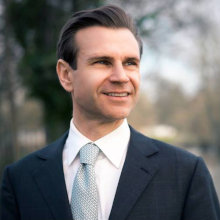Linguistic and Cultural Mediation
Enrolment until 2024/2025

[English below]
Matteo Legrenzi ha conseguito un dottorato in Relazioni Internazionali ed un master in studi Medio Orientali Moderni al St. Antony's College dell'Università di Oxford. E' stato Presidente della Società per gli Studi sul Medio Oriente (SeSaMO) ed è componente dell'International Advisory Council del World Congress for Middle East Studies (WOCMES) e del Consiglio dell'European Association for Middle Eastern Studies (EURAMES) oltre a sedere nel Comitato per gli Undergraduate Studies della Middle East Studies Association of North America (MESA). E' stato primo coordinatore della laurea triennale in Filosofia, Studi Internazionali ed Economici (PISE) insegnata in lingua inglese e del Double Degree con l'Università di Groningen. E' stato primo direttore del Master in Studi Strategici e Sicurezza Internazionale e coordinatore del Research Institute for International Studies. E' stato delegato del Rettore per i rapporti con il Medio Oriente e siede nel comitato di redazione della serie Elements in Middle East Politics della Cambridge University Press. E' socio dell'Istituto Affari Internazionali (IAI) e ad Oxford è Research Associate al Department of Politics and International Relations. Ha studiato la lingua araba all'Università Americana del Cairo. Ha pubblicato numerosi articoli scientifici e capitoli sulle monarchie arabe e le relazioni internazionali del Golfo e ha curato una rubrica sul Medio Oriente per "Il Mulino". Ha scritto tre monografie "The GCC and the International Relations of the Gulf: Diplomacy, Security and Economic Coordination in a Changing Middle East" per I.B. Tauris, "Cognitive Analysis of Decisionmaking: The Case of Israel in October 1973 Conflict" per Vita e Pensiero (Edizioni dell'Università Cattolica del Sacro Cuore di Milano) e "Le Monarchie Arabe del Golfo: Nuovo Centro di Gravità in Medio Oriente" per il Mulino. Ha inoltre curato tre volumi "Beyond Regionalism? Regional Cooperation, Regionalism and Regionalisation in the Middle East" e "Shifting Geo-Economic Power of the Gulf: Oil, Finance and Institutions" entrambi per Ashgate oltre a "Gulf Security: Legacies of the Past, Prospects for the future" per Routledge. Prima di ritornare a Venezia, sua città natale, ha insegnato ad Oxford, Ottawa e Seoul vincendo il Capital Educators' Award 2009 in Canada. È honorary research fellow all'Università di Exeter ed é stato parte dell' Advisory Board del Middle East Institute della School for Oriental and African Studies (SOAS). Sovrintende numerose Marie Curie Global Individual Fellowship, tre Marie Curie COFUND, sei Marie Curie Europe Individual Fellowship e cinque giovani ricercatori attraverso il programma NextGenerationEU. A livello italiano è P.I. del PRIN "New dimensions of regional security in the broader Middle East". Si occupa di relazioni internazionali del Medio Oriente e più specificatamente di politica economica, regionalismo e sicurezza delle monarchie arabe del Golfo. Ha inoltre sviluppato un interesse per le relazioni internazionali dell'Asia Nord-Orientale e la politica estera della Repubblica di Corea.
Matteo Legrenzi holds a D.Phil. in International Relations and a M.Phil. in Modern Middle Eastern Studies from St. Antony's College, Oxford. He served as President of the Italian Association for Middle Eastern Studies (SeSaMO) and is a member of International Advisory Council of the World Congress for Middle East Studies (WOCMES) and of the European Association for Middle Eastern Studies (EURAMES) Council as well as the Middle East Studies Association of North America's (MESA) Committee for Undergraduate Middle East Studies. He helped to establish and served as inaugural coordinator of the undergraduate program in Philosophy, International Studies and Economics (PISE) and its Double Degree with the University of Groningen. He was founding director of the Master in Strategic Studies and International security (SSSI) and coordinator of the Research Institute for International Studies. He is member of the Istituto Affari Internazionali (IAI) and in Oxford he is Research Associate at the Department of Politics and International Relations. He served as Rector's Delegate for the Middle East and he sits on the editorial board of the Elements in Middle East Politics series of Cambridge University Press. He sits on the International Evaluation Commission of the Institute for International and Area Studies (IIAS) of Tsinghua University. He studied Arabic at the American University in Cairo. He published numerous articles and book chapters on the Arab monarchies and the international relations of the Gulf as well as writing a column on Middle East politics for the Italian journal "Il Mulino". He wrote three monographs "The GCC and the International Relations of the Gulf: Diplomacy, Security and Economic Coordination in a Changing Middle East" for I.B. Tauris, "Cognitive Analysis of Decisionmaking: The Case of Israel in October 1973 Conflict" for Vita e Pensiero (Milan Catholic University Press) and, alongside Dr Cinzia Banco, "The Arab Monarchies of the Gulf: New Center of Gravity in the Middle East" for Il Mulino. He also edited three volumes "Beyond Regionalism? Regional Cooperation, Regionalism and Regionalisation in the Middle East" and "Shifting Geo-Economic Power of the Gulf: Oil, Finance and Institutions" for Ashgate Publishers and "Gulf Security: Legacies of the Past, Prospects for the future" for Routledge. Before returning to Venice, his hometown, he taught in Oxford, Ottawa and Seoul winning the Capital Educators' Award in 2009 in Canada. He is honorary research fellow at the University of Exeter and sat on the Advisory Board of the Middle East Institute of the School of Oriental and African Studies (SOAS). He currently supervises numerous Marie Curie Global Individual Fellowships, three Marie Curie COFUND, six Marie Curie Europe Individual Fellowships and five young researchers under the NextGenerationEU program. At the Italian level he is P.I. of the "New dimensions of regional security in the broader Middle East" national research project (PRIN). He deals with international relations and comparative government of the Middle East, in particular the political economy, regionalism and security of the Arab monarchies of the Gulf. He also developed an interest for the international relations of North-East Asia and the foreign policy of the Republc of Korea.